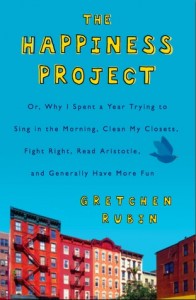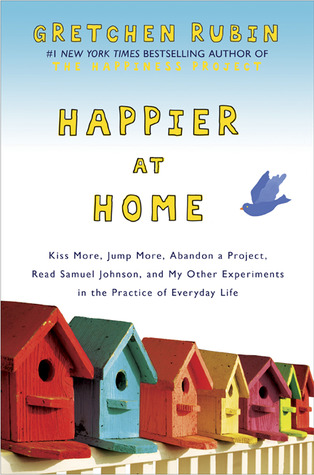 Title: The Happiness Project
Title: The Happiness Project
Author: Gretchen Rubin
Publication info: Harper Perennial (2009), paperback, 292 pages
Source: birthday present
Rating: 4 stars
One-sentence review: I loved this book, and though the premise was simple and the contents commonsensical, I was able to glean some great information and become more determined to be the guardian of my own happiness.
From Goodreads
Gretchen Rubin had an epiphany one rainy afternoon in the unlikeliest of places: a city bus. “The days are long, but the years are short,” she realized. “Time is passing, and I’m not focusing enough on the things that really matter.” In that moment, she decided to dedicate a year to her happiness project. . . . Her conclusions are sometimes surprising—she finds that money can buy happiness, when spent wisely; that novelty and challenge are powerful sources of happiness; that “treating” yourself can make you feel worse; that venting bad feelings doesn’t relieve them; that the very smallest of changes can make the biggest difference—and they range from the practical to the profound.
Written with charm and wit, The Happiness Project is illuminating yet entertaining, thought-provoking yet compulsively readable. Gretchen Rubin’s passion for her subject jumps off the page, and reading just a few chapters of this book will inspire you to start your own happiness project
Background
My incredibly thoughtful husband bought me this book for my birthday, having read really good reviews on Amazon and knowing that I’d been going through a sort-of funk. By the time my birthday rolled around, I was feeling much better, but because I love some good nonfiction, I gave this a shot. I was not disappointed.
The Good
The Happiness Project had a lot of good tips on how to take the happiness you have in your life and expand it within your individual capacity. The information–divided into sections according to items on a list of personal “commandments”–was backed up with a lot of good research and examples, and I was totally inspired to take my happiness into my own hands and improve my life–and, of course, create my own personal commandments, which I’m still working on following.
The Bad
I wouldn’t say this was really “bad,” but a lot of the information was common sense, and if I had wanted to do my own research, I would have come to some of the same conclusions. Sometimes the narrative felt a little rambling, but not as bad as the sequel (review on that coming soon!).
Bottom Line
I’d recommend this book wholeheartedly to anyone seeking greater happiness in his or her life, which I hope we’re all striving toward.
Rating: 4 stars
 Happier at Home
Happier at Home


